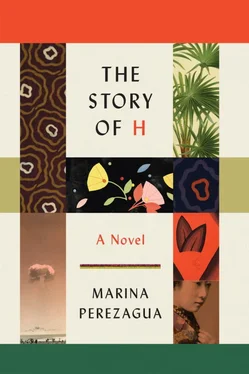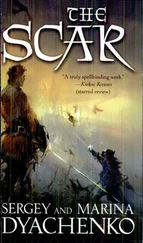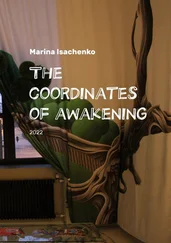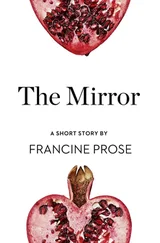Well then, allow me to explain why I don’t like history books, since this story on the whole is about history. At some point you’ve no doubt heard an eyewitness to some great historical event say things on the order of “I was born to bear witness for other people.” History with a capital H could be said to have imbued his or her life with a sense of purpose. Well, sir, that is not my case. I didn’t survive Hiroshima to bear witness. I survived Hiroshima because it was my duty to survive; this is why my mother brought me into this world, to observe what is in front of me, whether it be a bomb or a flock of sheep nibbling some peaceful green pasture. So simple, and yet not everyone can admit it. People need spectacular missions. Someone born in a tiny village in Provence decides it’s a tedious place. What kind of mission is it to wake up and see the same rocks every day? So he or she decides to study the Spanish Civil War. Then come a few trips to Spain and conversations with survivors. The tender small-town soul can’t abide such cruelty and a tear spills over a cheek, so she reads more books, let’s say several books, and the rest of her life is devoted to writing paragraph after paragraph from the lens of the side she has chosen to champion. She found her source of meaning. Research. Spread the word. Maybe that’s the historian’s ambition after all, to act as a messiah of information. And that’s all well and good, sir, it’s needed.
But let me tell you something else. This kind of so-called history isn’t worth a plugged nickel if it isn’t written from the emotion of universal pain. A war is much more than statistics, body counts, lists of atrocities. A war is a gaping wound in a human being’s sense of dignity; it’s a defect, a congenital deformity that expresses a failure of humanity. The historian who hasn’t lived through the episodes he or she is narrating should be writing from feelings of shame and compassion. Of course I could write a chapter on Hiroshima, not because it’s my birthplace, but because even as a child I could sense this human defect stealing into everyday life until it detonated into a Hiroshima, a Vietnam, or another tributary of the mighty river of war. I swear to you: a tree is not a single being. One tree’s breath comes from the lungs of another. Until a historian realizes this, his students appropriately will go on hating his classes, and what’s worse, forgetting them entirely. So I’ll try to give my own account, far removed from the detachment of a library-writing historian, as I lived through the events in the trenches, so to speak. I’m not sure whether I was on the winning or the losing side, and frankly I couldn’t care less. What I do know is that I lived my time in the first person, which gives me an advantage over those who find themselves in the dusk of their lives believing they participated in their time on earth because they read the Sunday paper.
As I said, a few months after Jim was boarded onto the ship, the history-altering baptism took place. It was August 6, 1945. The creature had no hands to bear arms, yet annihilated more than two hundred thousand lives that day; no mouth and yet it blew houses, trees, and factories to oblivion in a single breath. Conceived outside of any human warmth, it melted steel, cremated parks, pets, and pigeons. They hadn’t given it a gender either, but they did give it a name—Little Boy—and at 8:15 on a cloudless August morning, they unleashed that device over Hiroshima.
Before it was born, before it was christened with its name, Little Boy was no more than an abstract pattern in the brains of countries competing against one another to decipher it. It was so powerful and it changed my identity so drastically that for a long time I thought of it as a living being, and not of the men who created it. I imagined its gestation, how it could perceive the brain waves moving to and fro among the rival scientists racing to finish it. How it let itself be carried along the electrical currents, gliding through the neural pathways of the era’s most brilliant physicists. Often I fantasized about using the image of a CAT scan in which sections of the successful brain were illuminated, the one that discovered the formula, won the race, the sharpest of them all: J. Robert Oppenheimer’s. And I imagined how his little organic lantern, his firefly, must have stimulated the pleasure circuits in the satisfied physicists’ brains, whose intelligence had impregnated North America with Little Boy, its favorite son (or daughter?), the atomic bomb that defended the Allies in those difficult hours and, crucially, allowed them to win the war.
Since I was still so young and immature those first few years, I personified the bomb as an extension of my own identity, but eventually I shuffled the weight of responsibility to where it belonged: the man, the manifold who were capable of creating and detonating what is still the most lethal weapon known to humanity. But I don’t want my story to linger on these well-known facts. Allusions to the event are meant only as a backdrop over which something personal is being highlighted. If I can be so extravagant as to imagine a victim whom the bomb benefited, then I’m that victim. I forfeited limbs, whole chunks of my flesh, and my relatives, and though nothing could ever compensate me for these losses, I gained other important things. So my life is poised between grief over what the bomb took from me and celebration over something marvelous it gave me.
* * *
Morning had broken on what seemed like an ordinary day when Little Boy fell. It promised to be one of those placid, clear-skied days that lull you into thinking a place’s peacefulness extends over the rest of the planet. Same as every other day on earth, thousands and thousands of mothers were spreading their legs to give birth, bearing the pain children inflict as they make their way to the outside world. Legs didn’t open for Little Boy, though, but the bomb bay doors of a B-29. Many mothers were focused on breathing through contractions and the pain of labor while a bombardier was preparing the greatest contraction of them all: the global gash.
Little Boy was born and gave birth. It was at once deliverer and delivered, a nativity that gave birth to a colossal luminous mushroom-shaped cloud. For some, it meant total annihilation; for others, peace; and for all, it was light. A light so intense that people who saw it detonate before hitting the ground lost not only their sight but also their eyeballs. He (I can’t help giving it a personality) watched all the people looking up as he fell. He was the last thing they ever saw. Light. His father released through the gray ink of equations an eternal light that was bequeathed to the world. The formula could have been presented with the words “Behold, my son, the light of the world.” He’d never imagined it. Nobody had seen the shining until detonation, so it wasn’t until after Hiroshima that we knew our race would never be in the dark again.
Oppenheimer brought the most radical promise of light. This latter-day messiah, this higher god of theoretical physics, built a formula that could never be expunged, a weapon that outlived Little Boy, that would inseminate other countries at the speed of a rabbit, and today there are over twenty thousand bombs more potent than the one dropped on Hiroshima. Others claim there are many more than that. Whatever the case, there are at least twenty thousand rabbit-fucks and pyromaniacs who could incite a planetary inferno capable of liquidating us all in the ejaculation of a single sun, should nations get annoyed with one another. Forget Hiroshima. Little Boy’s nature is being cloned into thousands of iron-skinned brothers. As long as their creators keep them hidden, these clones will remain as lethargic as a hibernating bear, but when they are awoken, all the heat of all the summers will enter the lair, and all the caves, all the houses, all the mouths will open black as a door that wasn’t able to resist the heat when someone closed the oven. Then Hiroshima will be nothing but a piece of historical fluff. The time hasn’t come yet, so you who think of the planet as an everlasting place will think my testament outrageous. It seems outrageous to me too, but I know the world’s mechanism is being lubricated to make Hiroshima nothing more than the tangle in a strand of hair that has fallen out and been swept into the corner of that perpetually filthy house we call history.
Читать дальше












